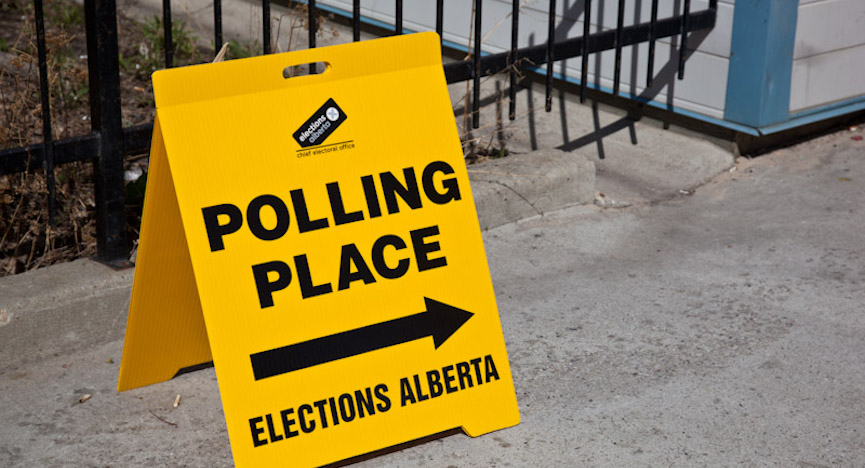Digital election theft allegations swirling around the 2017 United Conservative Party leadership campaign should be a sharp warning for the U.S. Democratic Party, which plans to use similar technology in some of its 2020 presidential primary races, says an American journalist who specializes in covering election technology and democratic issues.
While a recent voting fraud story in North Carolina got heavy coverage in the United States, the party-run election in Alberta was almost completely missed by U.S. journalists, wrote Steven Rosenfeld in the story published on March 6 on the San Francisco-based online magazine Salon.
Salon headlined the report, “Why an overlooked digital election theft controversy offers important lessons for Democrats.” Rosenfeld is the journalist mentioned in this space on February 28.
But while the North Carolina case grabbed the headlines, the Alberta story is more important because “the lessons go beyond technical glitches and human errors that have dogged telephone and online voting — which some Democratic caucuses may debut next year,” Rosenfeld explained. “Instead, they reveal how an aggressive campaign could hijack online votes.”
In Canada, the journalist told his U.S. readers, “recent party elections typically have involved online voting — which Democrats want to offer in the 2020 caucuses to increase participation. Such remote voting is the terrain where thousands of votes were allegedly stolen.”
Rosenfeld cites former UCP MLA Prab Gill’s February 11 letter to the RCMP — for which the UCP yesterday threatened to sue Gill — and interviewed former Progressive Conservative Deputy Premier Thomas Lukaszuk and University of Calgary Professor David Stewart for the piece.
There were decisions made by UCP officials “on the eve of the October 2017 leadership election and during the three days of online voting, which — intentionally or not — played into the purported vote-hijacking scheme,” Rosenfeld wrote. He cited the combination of denials by the party there were any problems with voting and its decision to reissue voters’ Personal Identification Numbers because the call centre had been busy and “it wanted to ensure members would be able to cast its ballot.”
“The combined official denials and resending of the PINs allowed the alleged vote theft scheme to continue,” he argued, saying these circumstances, “provide a clear example of how online votes can be hijacked by an aggressive insider campaign — amid an atmosphere of unfamiliarity surrounding a new voting system in a first-time party-run contest.”
Rosenfeld went into considerable detail in the magazine article about how he believes digital fraud in Alberta could have occurred.
Rosenfeld’s warning is directed in particular to the Iowa Democratic Party, which has been considering using similar vendor-supplied technology to allow remote voting in the renowned Iowa Caucuses.
The “caucuses,” political party meetings at which state citizens select their favoured presidential candidates, are traditionally the first contest of the pre-election primary season, and are considered an important indicator of which candidates are likely to emerge as the leaders. The next Iowa Caucuses are expected to take place on February 3, 2020.
UCP lawsuit threat against MLA a dangerous development
The United Conservative Party threatened yesterday to sue dissident Independent MLA Prab Gill for defaming the party in his complaint to the RCMP.
In the unlikely event such a lawsuit were to succeed, it would be a shocking and dangerous development in the history of Canadian democracy.
A letter sent on February 25 by to Gill by a lawyer for the UCP called the Calgary-Greenway MLA’s allegations “outrageous and plainly false” — typical boilerplate phrasing for letters threatening defamation suits in Canada. I’ve seen a few over the years, by the way.
What’s unusual is the implication in lawyer Stephen Dollansky’s letter that Gill was defaming the party. This was made explicit by UCP Leader Jason Kenney’s statement to reporters yesterday that Gill will “be held accountable if he defames the official Opposition with these ridiculous conspiracy theories.”
Corporations — and more recently cooperatives and unions — have won the right to sue individuals based on the legal fiction they are “persons.” This in itself is a dangerous and anti-democratic trend that is frequently used by the corporate sector in particular to suppress legitimate free speech.
Presumably, a clever lawyer for a political party could make an argument for this right to be extended to political parties. If such an effort succeeded, the effect would be pernicious and quite dangerous to democracy.
As Justice William J. Brennan Jr. of the U.S. Supreme Court wrote in a most famous ruling, in a democracy like the United States, “debate on public issues should be uninhibited, robust, and wide‐open, and that it may well include vehement, caustic, and sometimes unpleasantly sharp attacks on government and public officials.”
Apparently Kenney and the United Conservative Party do not share Justice Brennan’s view of the value of free expression, at least when it is applied to Canada and Alberta, or when it involves uninhibited and robust attacks on them.
Gill, unlike most of us, has an additional potential defence. He may also be able to invoke Parliamentary privilege to protect himself from such an action.
In Canada, the Senate, the House of Commons and provincial legislatures all follow the traditional British definition of Parliamentary privilege, which includes, freedom of speech, freedom from arrest in a civil action, and exemption from appearing as a witness.
The Wikipedia notes that “Parliamentary privilege is controversial because … a member can use privilege to make damaging allegations that would ordinarily be discouraged by defamation laws.”
Parliamentary privilege also includes freedom from obstruction, interference, intimidation and molestation, which could mean the video recording of Gill made and distributed by the UCP, reported here yesterday, is also a violation of Gill’s privilege as an MLA.
This post also appears on David Climenhaga’s blog, AlbertaPolitics.ca.
Image: patternghosts/Flickr
Help make rabble sustainable. Please consider supporting our work with a monthly donation. Support rabble.ca today for as little as $1 per month!




